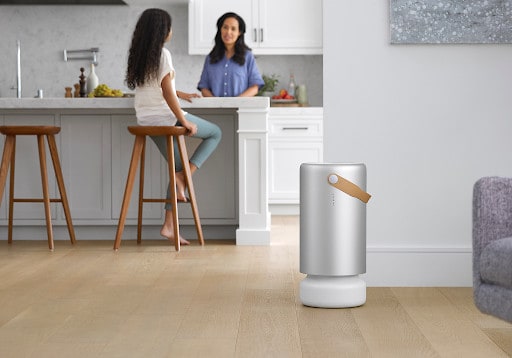
Have you ever wondered about the quality of the air you breathe? In 2019, 70 million tons of pollution were emitted into the atmosphere in the United States, according to the EPA. And that doesn’t even include the naturally occurring particles that are harmful to human health, like pollen and animal dander.
Even worse, our indoor air can have up to five times more pollutant types than are found indoors in even the largest and dirtiest cities.
We talk all the time about “getting a breath of fresh air” by going outside, but we never seem to connect what that means about the air we breathe inside. If fresh air is outside, then we subconsciously know that the air in our house and office is stagnant and filled with circulating particles.
But when allergy season hits, we tend to bunker inside – unconcerned about the quality of our indoor air. There is a better solution. Molekule is revolutionizing indoor air. With cutting-edge technology, Molekule units are destroying particles – not just trapping them. The nanotechnology targets even tiny viruses and pollutants like VOCs, which can often slip through filters.
Now, Molekule has announced the launch of a special Molekule Air Quality Review skill through Amazon. This informative tool will help you understand the quality of outdoor air, helping you access critical information for health purposes. The Alexa Skill is free to enable.
Alexa and Quality Air Reporting
Anyone who struggles with asthma or allergies knows how important the outdoor air quality rating is. Now, with the help of Molekule and AirNow, you can get fast and free access to the U.S. Air Quality Index (AQI).
The user launches the skill by asking Alexa questions like, “Alexa, how is the air quality today?” or “Alexa, what’s the air quality near me?” Alexa will then use the enabled device’s location to pull data from The World Air Quality Project to provide the air quality information index for the user’s area.
The skill can also be launched by stating: “Alexa, launch Air Quality Index.” With the skill accessed, you can ask for specific details, including but not limited to:
- “What is today’s air quality score?”
- “Get me today’s air quality report.”
- “What’s the air quality like today?”
- “Tell me today’s air quality rating.”
- “What’s today’s air quality index?”
“What’s the air quality rating near me today?”
As soon as you ask Alexa to access the Air Quality Index, you will receive the air quality index number for your area, followed by whether that number is good, moderate, or poor.
This skill allows Alexa to give you additional health-related information. This includes helping you know if you should spend time outside or increase the air purifier rate in your space. It will also help you know if the air is especially dangerous for those with health conditions, older adults, or children who could be especially susceptible to poor air quality.
What Is Unhealthy Air?
When you get a low rating on the new Alexa skill for air quality, you might wonder how it’s ranked. In the U.S., the Environmental Protection Agency (EPA) measures five kinds of air pollutants. These include:
- Carbon monoxide.
- Particle pollution.
- Ground-level ozone.
- Sulfur dioxide.
- Nitrogen dioxide.
This scale will range from 0–500, with the lower numbers being ideal. While 0–50 (green) is considered good and healthy air, 51-100 (yellow) is acceptable, but a warning sign for sensitive groups. 101–200 (orange) is considered unhealthy for certain groups, and 201–250 (red) is unhealthy air for everyone. When the air gets to 301 and up (maroon), it’s considered hazardous.
The five different pollutants are dangerous at different concentrations, so their levels are translated into the 0-500 scale so everyone understands. Most cities are typically in the green level, but wildfires will typically send them into very high numbers.
The EPA ratings exist because low-quality air can have both long-term and short-term health impacts. Even for a lower orange level (101–200), air might be dangerous for intense athletic events or practices. Each pollutant has a different impact on the body, including short-term struggles with sore throat, difficulty breathing, sluggish mental function, and vision problems. If air quality is not improved, there could be long-term side effects, including respiratory issues and even death.
Addressing the Problem of Poor Air
“The face of today’s air pollutants is rapidly changing to include things like toxic chemicals from smoke, in addition to bacteria and airborne viruses. We believe this air pollution challenge needs new and advanced technology,” says Jaya Rao, co-founder of Molekule.
Particles in the air can hurt us – both natural allergens and unnaturally high levels of chemicals or viruses. When air pollution reacts to sunlight, it can become ozone – especially in the heat of summer. And this hazard can make it difficult to breathe, exacerbating lung issues and making them susceptible to infection.
When the air outside is dangerous or unhealthy, it’s important to stay inside. Closing the windows, refreshing the HVAC filter, and using an air purifier is the best way to create a healthier indoor space. Knowing that the air is bad before you even go out can help ensure that you don’t run five miles or attend a kid’s baseball game while the air quality is harmful.
With Molekule’s new Alexa skill, you can now check the air index quickly while you get ready for your day.
About Molekule
Molekule is committed to helping improve air quality everywhere for everyone. The company is working to increase the use of PECO technology – a patented nanotechnology that breaks down harmful particles in the air – including viruses, mold, and pollen. A third-party Molekule review also shows that units emit no ozone and actually reduce any ozone already in the air.
Molekule units are available on the Molekule website or through retail partners, like Home Depot, Bestbuy.com, and Amazon.


